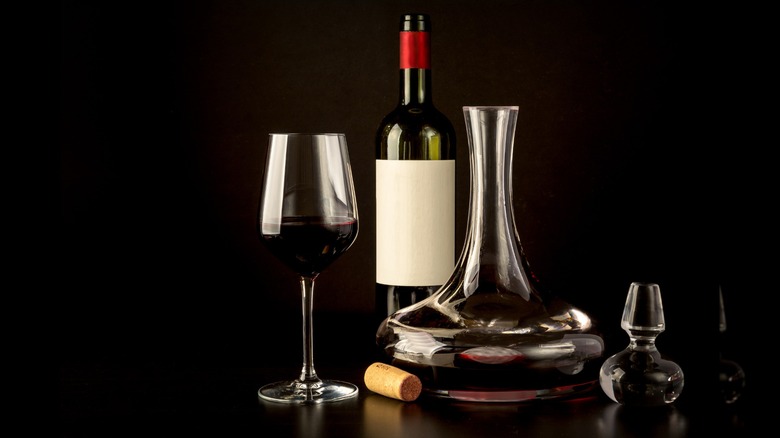How To Know If You Should Decant Your Bottle Of Wine
To decant or not to decant? That is the question. It's not necessary or even recommended in all circumstances; it all comes down to the wine you're pouring. Decanters are mostly used when opening an older bottle of wine that has been aged for some time or for a younger bottle to aerate before serving.
Decanting involves pouring a bottle of wine into a larger, open vessel instead of into glasses straight from the bottle. Decanting is commonly used with aged wines to remove solids that may have accumulated during fermentation and aging. Also, if a wine is made unfiltered, it must be decanted to remove this sediment before consumption.
The decanter also gives the wine some contact with oxygen before drinking, which can soften and round out chemical compounds called tannins. They're responsible for the dry, sometimes astringent feel of some wines that, given time, can evolve into a beautiful melange of flavors and textures. Tannic red wines can age for years or decades, but you may not want to wait that long. This is where a decanter comes in handy — when you want to drink the wine now, aeration can help to open a wine, even if it hasn't aged to its fullest potential.
Decanters excel in elegance, form, and function
Keep in mind that certain wines will rarely be decanted, like young, sparkling, white, and rosé wines. The key word is "young" since some of these wines, when older, might benefit from some decanting, but these cases are rare. When in doubt, taste the wine. If it's expressive and enjoyable out of the bottle, there's no need to decant. If you're still unsure, pour half into the decanter and give it 30 minutes, then compare the decanted and bottled versions and go with the one you prefer.
If you're decanting to remove sediment, it helps to let the sediment accumulate at the bottom of the bottle before being poured into the vessel. When you pour it, do so in front of a candle or light to watch that the sediment does not pass the neck of the bottle. To be extra sure, you can also drape a cheesecloth over the decanter to catch any small bits.
Although aeration and sediment removal for aged wines are the most common reasons to decant, we have to admit that there is another reason. A decanter looks cool, full stop. If you're serving a group and expect to drink two or more bottles, pouring them into a large decanter can make the table look more elegant while giving the wine a little air. It will seldom hurt the wine to aerate briefly, so if you like the vessel's look, pour away.

